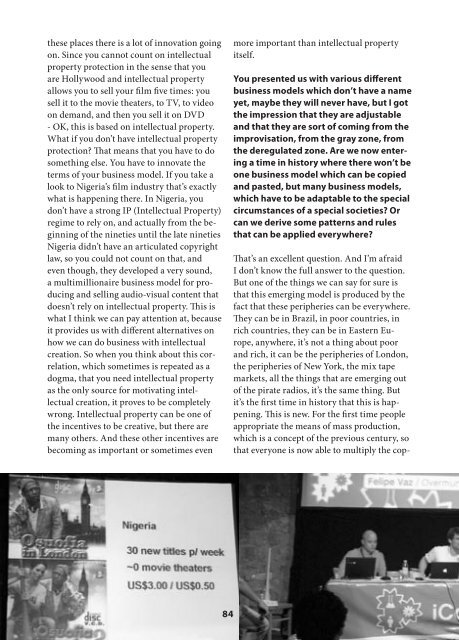You also want an ePaper? Increase the reach of your titles
YUMPU automatically turns print PDFs into web optimized ePapers that Google loves.
these places there is a lot of innovation going<br />
on. Since you cannot count on intellectual<br />
property protection in the sense that you<br />
are Hollywood and intellectual property<br />
allows you to sell your film five times: you<br />
sell it to the movie theaters, to TV, to video<br />
on demand, and then you sell it on DVD<br />
- OK, this is based on intellectual property.<br />
What if you don’t have intellectual property<br />
protection? That means that you have to do<br />
something else. You have to innovate the<br />
terms of your business model. If you take a<br />
look to Nigeria’s film industry that’s exactly<br />
what is happening there. In Nigeria, you<br />
don’t have a strong IP (Intellectual Property)<br />
regime to rely on, and actually from the beginning<br />
of the nineties until the late nineties<br />
Nigeria didn’t have an articulated copyright<br />
law, so you could not count on that, and<br />
even though, they developed a very sound,<br />
a multimillionaire business model for producing<br />
and selling audio-visual content that<br />
doesn’t rely on intellectual property. This is<br />
what I think we can pay attention at, because<br />
it provides us with different alternatives on<br />
how we can do business with intellectual<br />
creation. So when you think about this correlation,<br />
which sometimes is repeated as a<br />
dogma, that you need intellectual property<br />
as the only source for motivating intellectual<br />
creation, it proves to be completely<br />
wrong. Intellectual property can be one of<br />
the incentives to be creative, but there are<br />
many others. And these other incentives are<br />
becoming as important or sometimes even<br />
84<br />
more important than intellectual property<br />
itself.<br />
You presented us with various different<br />
business models which don’t have a name<br />
yet, maybe they will never have, but I got<br />
the impression that they are adjustable<br />
and that they are sort of coming from the<br />
improvisation, from the gray zone, from<br />
the deregulated zone. Are we now entering<br />
a time in history where there won’t be<br />
one business model which can be copied<br />
and pasted, but many business models,<br />
which have to be adaptable to the special<br />
circumstances of a special societies? Or<br />
can we derive some patterns and rules<br />
that can be applied everywhere?<br />
That’s an excellent question. And I’m afraid<br />
I don’t know the full answer to the question.<br />
But one of the things we can say for sure is<br />
that this emerging model is produced by the<br />
fact that these peripheries can be everywhere.<br />
They can be in Brazil, in poor countries, in<br />
rich countries, they can be in Eastern Europe,<br />
anywhere, it’s not a thing about poor<br />
and rich, it can be the peripheries of London,<br />
the peripheries of New York, the mix tape<br />
markets, all the things that are emerging out<br />
of the pirate radios, it’s the same thing. But<br />
it’s the first time in history that this is happening.<br />
This is new. For the first time people<br />
appropriate the means of mass production,<br />
which is a concept of the previous century, so<br />
that everyone is now able to multiply the cop-


